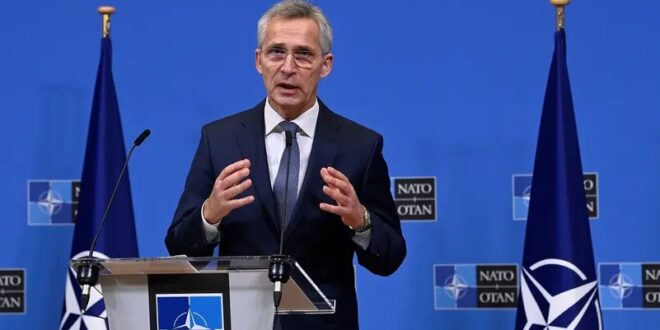The Russian invasion of Ukraine in 2022 was pivotal during what was a tumultuous year in NATO history, but the countries of the alliance rose to the challenges of Russia’s brutal aggression, NATO Secretary General Jens Stoltenberg said today, as he unveiled his annual report for 2022 during a news conference in Brussels.
As the invasion enters its second year, Stoltenberg took stock of the alliance and said the North Atlantic Treaty Organization is more unified than it has been since at least then end of the Cold War.
Stoltenberg said Russian President Vladimir Putin made a strategic mistake invading Ukraine. “He expected Kyiv would fall within days, and the whole of Ukraine within weeks,” the secretary general said. “But he underestimated the steely resistance of the Ukrainian people. He thought he could break NATO unity.”
But the NATO allies are strong and united, and NATO allies and their many partners are providing unprecedented support for Ukraine.
Putin wanted less NATO, Stoltenberg said, “but he has got exactly the opposite — more NATO.”
The brutal Russian invasion caused Finland and Sweden – long NATO partners – to apply for full alliance membership. The move makes the Baltic Sea a NATO lake on Russia’s doorstep and doubles the length of NATO’s border with Russia.
“At the NATO summit in Madrid last June, all allies took the historic decision to invite Finland and Sweden to join,” he said. “Both countries have addressed Turkey’s legitimate security concerns and delivered on their commitments under the Trilateral Memorandum agreed [to] in Madrid. Turkey is now ready to ratify Finland’s membership of NATO. I welcome that decision.”
The legislatures of Turkey and Finland will vote on Finland’s accession soon. “The most important thing is that both Finland and Sweden become full members of NATO quickly, not whether they join at exactly the same time,” he said. “And I will continue to work hard to ensure that Sweden becomes a full member as soon as possible because the accession of Finland and Sweden will make them safer, our alliance stronger and demonstrate that NATO’s door remains open.”
Putin sees democracy and freedom as threats, and he wished to control Russia’s neighbors, Stoltenberg said.
“So even if the war in Ukraine ended tomorrow, the security environment has changed for the long term,” Stoltenberg said, “Putin’s invasion last year was a shock, but it was not a surprise. It was the culmination of a pattern of aggressive action.”
Since Russia first invaded Ukraine in 2014 and illegally annexed Crimea and claimed the eastern provinces of Ukraine, NATO has responded. “NATO has implemented the largest reinforcement of our collective defense in a generation,” he said. “So, when Russian tanks rolled into Ukraine, we were ready. Within hours, we activated our defense plans from the Baltic to the Black Sea.”
The 40,000 troops under NATO command were backed by significant air and naval forces. The alliance also doubled the number of NATO battlegroups from four to eight.
“At the same time, NATO allies have provided Ukraine with significant support, supplying advanced weapons systems and ammunition to help Ukraine defend itself and regain territory,” he said. “We are also in the process of agreeing new capability targets for the production of battle-decisive ammunition and engaging with industry to ramp up production to support Ukraine against Russia’s aggression and for our own defense.”
Stoltenberg said 2022 was a defining year in other ways, as well. At NATO’s Madrid summit, the leaders of participating nations agreed to “a further, fundamental shift in our deterrence and defense, with new plans assigning specific forces to defend specific allies, higher readiness, more stocks and more pre-positioned equipment, and even stronger command and control arrangements.”
The leaders – including President Joe Biden – agreed to a new strategic concept addressing the challenges of strategic competition.
The concept identifies Russia as the most significant threat to security, along with the ongoing threat of terrorism. It also “makes clear that China challenges our interests, security and values,” Stoltenberg said.
Last year was the eighth consecutive year of increased defense spending across Europe and Canada. “Last year, defense spending increased by 2.2 percent in real terms,” he said. “Since allies agreed [to] the Defense Investment Pledge in 2014, European allies and Canada have spent an additional $350 billion extra on defense.”
Russia’s invasion also prodded many NATO allies to increase that number further. “Now, these pledges must turn into real cash, contracts and concrete equipment,” Stoltenberg said. “Because defense spending underpins everything we do.
The secretary general welcomed the progress, but he said more needs to happen. “It is obvious that we need to do more, and we need to do it faster,” he said. “At our summit in Vilnius [Lithuania] in July, I expect allies to agree a more ambitious new defense investment pledge with 2 percent of [gross domestic product] as a minimum to be invested in our defense.
“In this new and more contested world, we cannot take our security for granted,” he continued. “It is our security that underpins our prosperity and our way of life.”
And the people of the alliance understand this, Stoltenberg said. “Our latest polling shows that 82 percent of people across the 30 NATO allies believe it is important that North America and Europe work together for our shared security, and 61 percent agree that NATO membership makes an attack from a foreign nation less likely,” Stoltenberg said.
“NATO has enabled Europe and North America to live in peace for almost 75 years. But today’s world is as dangerous as at any time since the Second World War. The years to come will be challenging, and NATO must continue to rise to the challenge.”
 Eurasia Press & News
Eurasia Press & News



